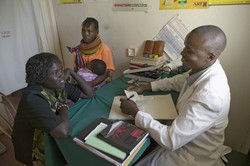Research exchanges for African health
Most western countries routinely collect and maintain comprehensive population health data. However, where such data are unavailable, indirect data collection methods can offer an effective substitute. The EU-funded IPHTRE (Improving population health through research exchanges) project administered a researcher exchange scheme to enhance an existing study. Since 1992, South Africa’s University of Witwatersrand has operated a population health research centre in the country’s Agincourt district. The long-term investigation has collected detailed health data from a population of over 100 000. IPHTRE was intended to enhance the capacity of the University’s study, rather than to produce scientific results per se. The project was a member of the FP7 INDEPTH network, which groups similar population studies across Africa and Asia. IPHTRE covered five areas of research: verbal autopsies, assessing adult health and ageing in Africa, the effects of enumeration on populations, HIV population geography and consequences of rural African epilepsy. The first topic, verbal autopsies, means to determine cause of death by interviewing the deceased’s family members. The technique is important for developing reliable cause-of-death profiles where deaths are not usually assigned causes, and enables comparison between populations. IPHTRE research contributed to the World Health Organization’s (WHO) efforts to standardise the technique, and to a computer model that assigns cause of death under the WHO standard. Researchers also studied adult health in Africa. The work benefited study of the health of older Africans. A further contribution was study of the perspectives of the community contributing to the research data. The team investigated the community’s perceptions and understanding of their participation. The project’s work on HIV/AIDS helped clarify patterns in the epidemic that would have been difficult to detect otherwise. Such work helped with containment and with support for HIV sufferers. Project work on epilepsy also helped bring new insights regarding the nature of the problem in Africa. Generally, the IPHTRE project’s research exchanges helped support the long-term African health study.



